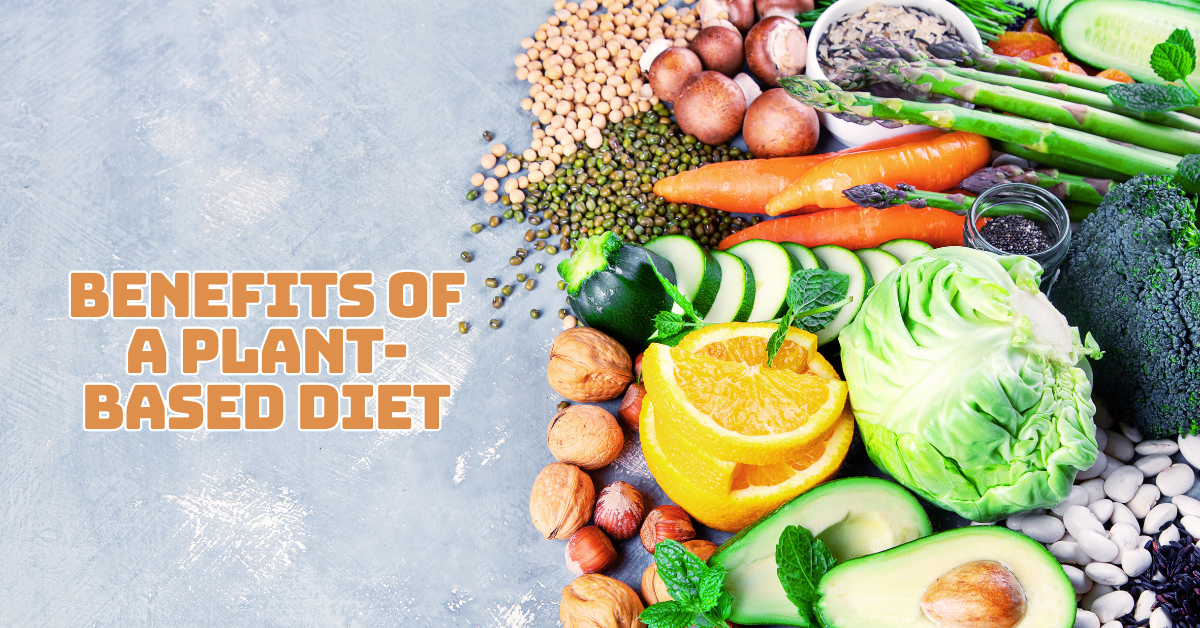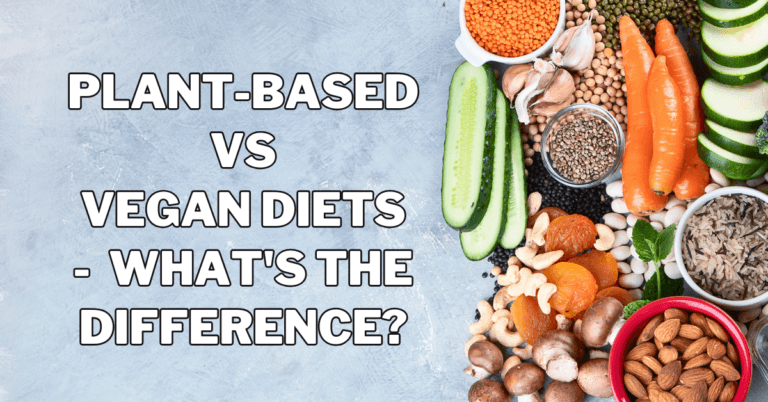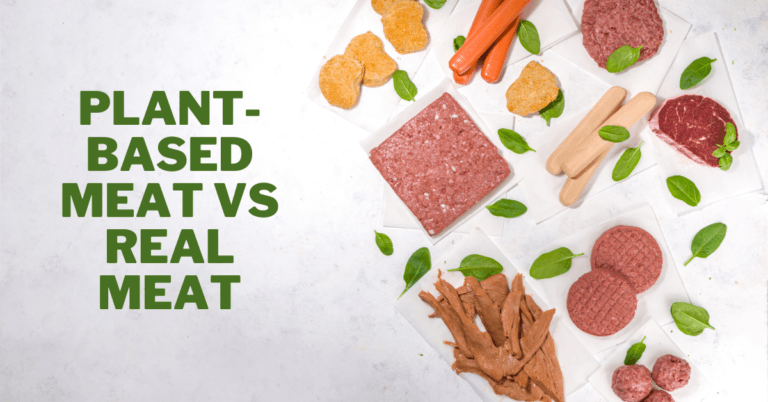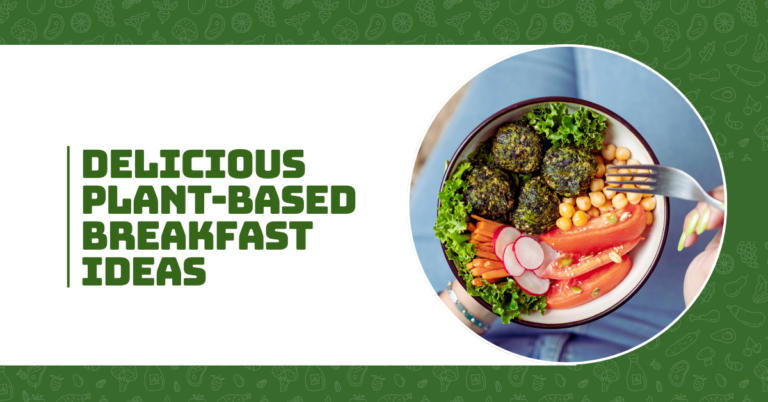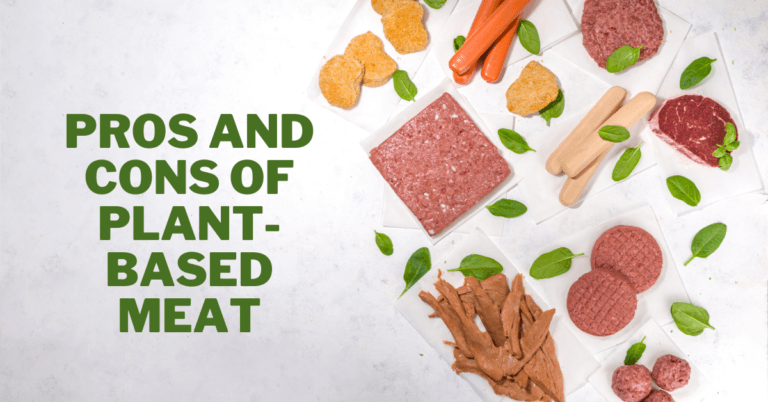Benefits Of A Plant-Based Diet
A plant-based diet is a great way to improve the world and one's well-being. It has many ethical, environmental, and health benefits, including weight management and disease prevention. It also has positive environmental impacts, such as reduced carbon footprints and water conservation.
Adopting a plant-focused diet can lead to a healthier planet and a vibrant, energetic life, whether for personal well-being or sustainability. This article explores its many benefits!
What Is Plant-Based Eating?
Plant-based eating focuses on consuming whole, natural foods derived from plants while minimizing or eliminating animal products.
It includes fruits, vegetables, legumes, whole grains, nuts, and seeds—nutrient-dense foods that fuel the body with essential vitamins, minerals, and fibre.
Unlike strict veganism, plant-based diets can be flexible, allowing occasional animal products while prioritizing plants as the foundation of meals.
Among the primary benefits of a plant-based diet are the health benefits. Research indicates that plant-based diets promote improved digestion and higher energy levels while reducing the risk of obesity, diabetes, and heart disease.
Additionally, plant-based diets promote environmental sustainability by reducing greenhouse gas emissions, water consumption, and deforestation linked to animal agriculture.
Embracing plant-based eating isn’t about deprivation—it’s about abundance. Endless flavorful combinations encourage creativity in the kitchen and a deeper connection to nourishing foods.
This eating pattern can lead to a healthier, more sustainable lifestyle, whether you follow an entirely plant-based diet or add more plant-based foods to your plate.
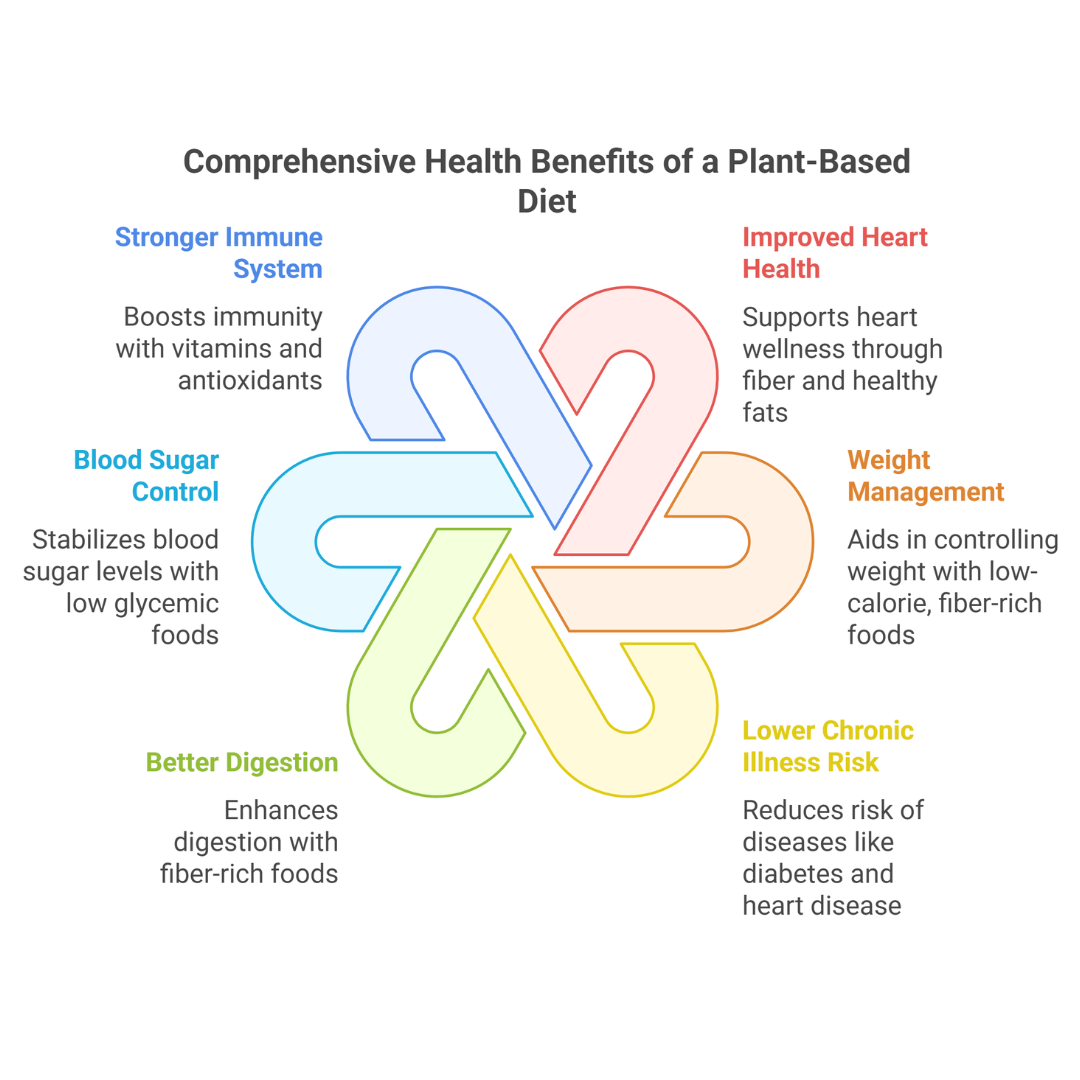
Health Benefits Of A Plant-Based Diet
1. Improved Heart Health
A plant-based diet supports heart health by providing fibre, antioxidants, and healthy fats that improve cholesterol levels.
Fibre helps remove excess LDL (bad cholesterol), while antioxidants reduce inflammation, preventing artery damage. Healthy fats from nuts, seeds, and avocados increase HDL (good cholesterol), promoting balanced circulation.
These combined benefits help lower blood pressure, reduce the risk of heart disease and support long-term cardiovascular wellness.
2. Weight Management
A plant-based diet supports weight control by offering low-calorie, fibre-rich foods that enhance fullness and reduce overeating.
The high water content in fruits and vegetables boosts satiety, making portion control easier. Since plant-based meals are naturally less processed and lower in unhealthy fats, they promote steady weight loss or maintenance, helping you achieve a balanced and sustainable healthy lifestyle.
3. Lower Chance Of Chronic Illnesses
A plant-based diet boosts metabolism, reduces inflammation, and lowers the risk of heart disease, stroke, and type 2 diabetes. Fruits and vegetables contain antioxidants that protect cells from damage, while whole grains and legumes minimize inflammation.
This diet helps regulate blood sugar, improve cholesterol levels, and support overall metabolic health. By prioritizing nutrient-dense, anti-inflammatory foods, a plant-based lifestyle is a powerful shield against chronic illnesses, enhancing long-term well-being.
4. Better Digestion
A plant-based diet is fibre-rich, which keeps digestion smooth by promoting regular bowel movements and preventing constipation.
Fibre also feeds beneficial gut bacteria, supporting a balanced gut microbiome. This improves nutrient absorption, reduces bloating, and enhances overall digestive health.
Eating more fruits, vegetables, and whole grains naturally creates a healthier, more efficient digestive system.
5. Improved Blood Sugar Control
Plant-based foods, including whole grains, legumes, and vegetables, have a low glycemic index, which helps prevent sudden spikes in blood sugar levels.
Their high fibre content slows sugar absorption, stabilizing glucose levels and improving insulin sensitivity. This makes plant-based eating an excellent choice for diabetes management and overall metabolic health.
Focusing on slow-digesting foods high in nutrients will help you stay energized and lower your risk of blood sugar abnormalities.
6. More Muscular Immune System
A plant-based diet strengthens immunity by supplying essential vitamins, minerals, and antioxidants. Nutrients like vitamin C, zinc, and flavonoids help fight infections, speed healing, and reduce inflammation.
By nourishing the body with colourful fruits, vegetables, and whole grains, you enhance your body’s natural defence system, making it more resilient against colds, flu, and other illnesses.
7. Increased Energy
A plant-based diet provides increased energy, as whole plant foods offer steady fuel throughout the day and help stabilize blood sugar levels.
Unlike processed foods that cause energy crashes, plant-based meals release energy gradually, keeping you fueled throughout the day.
Fruits, vegetables, legumes, and whole grains help maintain steady blood sugar levels, keeping you active, focused, and energized without relying on stimulants or sugary snacks.
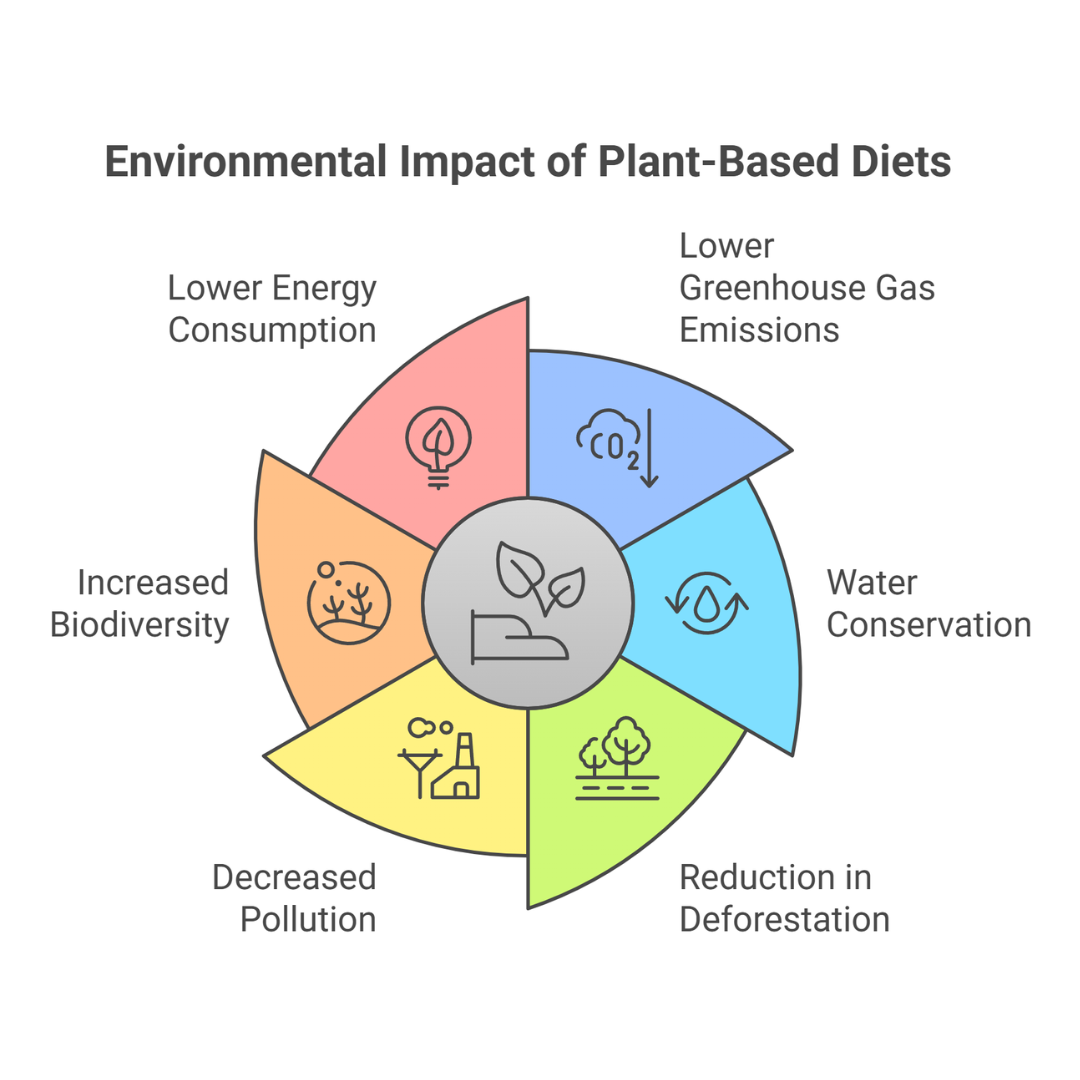
Environmental Benefits Of A Plant-Based Diet
The shift toward a plant-based diet is gaining momentum, not just for health reasons but also for its significant environmental benefits. Here is how:
1. Lower Emissions Of Greenhouse Gases
Animal husbandry accounts for around 14.5% of worldwide greenhouse gas emissions and is a major producer of carbon dioxide, nitrous oxide, and methane.
Livestock farming requires vast resources, access and accelerated change. By shifting to plant-based foods, we reduce emissions, lower our carbon footprint, and help combat global warming, making food production more sustainable for the planet’s future.
2. Conservation Of Water Resources
The meat and dairy industry is highly water-intensive. Producing a pound of beef requires almost 1,800 gallons of water, but crops like beans and lentils use only a tiny amount. Individuals can help conserve water by consuming plant-based foods, thereby making more water available for essential uses.
3. Reduction In Deforestation And Land Use
Animal agriculture drives deforestation by clearing forests for grazing and for animal feed crops like soy and corn. The Amazon rainforest has faced massive destruction due to cattle ranching.
A plant-based diet requires significantly less land, preserving ecosystems, protecting biodiversity, and reducing wildlife habitat loss, helping maintain the planet’s natural balance and sustainability.
4. Decreased Pollution
One advantage of a plant-based diet is that it lowers agricultural pollution, which preserves water quality, enhances air quality, and promotes ecosystem health.
These contaminants harm rivers, oceans, and drinking water supplies. Choosing plant-based foods reduces agricultural pollution, helps protect waterways, improves air quality, and maintains healthier ecosystems for humans and wildlife.
5. Increased Biodiversity
Livestock farming destroys natural habitats, threatening countless species with extinction. Expanding grazing lands and feed crops leads to deforestation and ecosystem loss.
Reducing meat consumption helps preserve forests, wetlands, and grasslands, allowing wildlife to thrive. A plant-based diet supports biodiversity by reducing habitat destruction and maintaining the delicate balance of nature.
6. Lower Energy Consumption
Animal agriculture consumes vast amounts of energy for feed production, transportation, and processing, increasing fossil fuel use. In contrast, plant-based foods require significantly fewer resources, reducing energy demand.
Eating a plant-based diet can reduce the adverse environmental effects, lessen dependency on nonrenewable energy sources, and help create a more sustainable and effective food system.
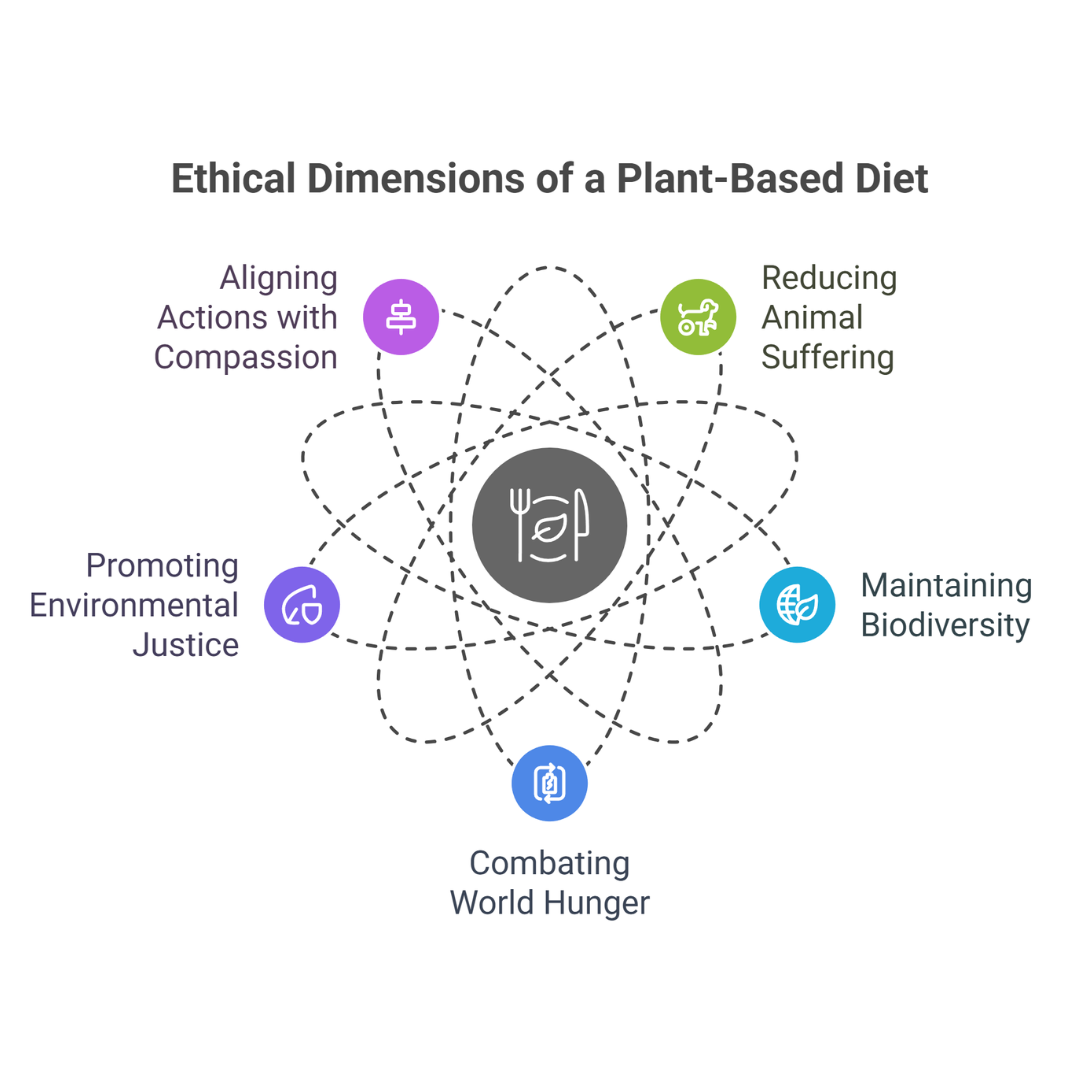
Ethical Benefits Of A Plant-Based Diet
In recent years, the plant-based movement has gained momentum for health and environmental reasons and its ethical implications.
People can create a more compassionate and just world by adopting a plant-based diet. Here are some key ethical benefits of adopting a plant-based lifestyle:
1. Reducing Animal Suffering
Reducing animal suffering is one of the strongest moral arguments in favour of a plant-based diet. Industrial animal agriculture subjects billions of animals to inhumane conditions, including overcrowding, confinement, and painful procedures without anesthesia.
Reducing or eliminating animal products in our meals can encourage more humane treatment of animals and reduce the need for factory farming.
2. Maintaining Biodiversity
Animal agriculture causes deforestation, species extinction, and habitat damage. Rainforests and other ecosystems are often cleared to make space for livestock grazing or to grow animal feed crops.
This destruction displaces countless species, resulting in biodiversity loss. A plant-based diet requires fewer resources and helps protect wildlife's natural habitats.
3. Combating World Hunger
Feeding animals for meat production is more inefficient than growing crops for direct human consumption. Large amounts of grain and water are required to raise livestock, yet millions worldwide suffer from hunger and malnutrition.
The benefits of a plant-based diet include more efficient use of agricultural resources, helping to address hunger and malnutrition by directly feeding the global population.
4. Promoting Environmental Justice
Low-income neighbourhoods are frequently home to factory farms and slaughterhouses, exposing underprivileged populations to pollution, tainted water, and poor air quality.
These environmental hazards increase residents' health risks. By reducing reliance on animal agriculture and choosing plant-based foods, we support a fairer, more sustainable food system that protects vulnerable populations and promotes social and environmental justice.
5. Aligning Actions With Compassion
Many value kindness and respect, yet traditional diets often conflict with these beliefs. Factory farming involves animal suffering, deforestation, and environmental harm.
People who eat a plant-based diet reduce harm to animals and the environment by bringing their behaviour into line with their moral principles. This conscious choice fosters greater compassion and promotes a more humane world for all living beings.
Want to Share Your Passion for Vegan Living?
Discover how easy and fulfilling vegan living can be —
from recipes and travel to lifestyle and sustainability tips.
Read this blog post next:
How to Start a Vegan Blog (and Turn Your Passion into Purpose).
Transitioning To A Plant-Based Diet
Eating a plant-based diet can seem like a significant step, but it's an exciting adventure with tasty food, health advantages, and a positive environmental impact.
Here’s a practical and engaging guide to help you confidently shift toward a plant-based lifestyle:
1. Start Small And Progress Gradually
Going plant-based doesn’t mean you must give up all animal products overnight. Instead, take small steps that feel manageable.
Begin by dedicating one or two days a week to plant-based meals, such as “Meatless Mondays.” Slowly increase the number of plant-based options in your diet while reducing meat, dairy, and processed foods. This method makes the change sustainable while allowing your taste receptors to adapt.
2. Explore And Enjoy Plant-Based Alternatives
The benefits of a plant-based diet include a variety of delicious alternatives, making it easy to replace familiar foods while still enjoying their flavours and textures.
Swap dairy milk for almond, oat, or soy milk. Try plant-based meat substitutes like lentil burgers, tofu, or tempeh. Explore dairy-free cheeses and yogurts made from cashews or coconut.
Experimenting with these options makes it easier to replace familiar foods while still enjoying their flavours and textures.
3. Build Balanced And Nutrient-Rich Meals
A well-planned plant-based diet is packed with nutrients, but eating a variety of foods to meet your needs is essential.
Emphasize protein-dense legumes like black beans and chickpeas, whole grains like brown rice and quinoa, and healthy fats from avocados, almonds, and seeds.
Colourful fruits and vegetables provide essential vitamins and antioxidants, energizing and nourishing your body.
4. Find Delicious And Simple Recipes
Cooking plant-based meals can be fun and rewarding, especially when you discover new flavours and techniques.
Look for easy recipes like vegetable stir-fries, hearty lentil soups, or avocado toast with hemp seeds. Websites, cookbooks, and food blogs offer endless plant-based meal ideas. The more you experiment, the more you’ll find meals you love.
5. Plan Your Meals And Snacks
Planning your meals guarantees that you always have plant-based options and helps you stay on track. Make a shopping list with staple ingredients like beans, whole grains, nuts, and fresh produce.
Prepare meals in advance, such as overnight oats for breakfast or batch-cooked chilli for busy days. Keep plant-based snacks like hummus, trail mix, or fruit on hand to avoid cravings for processed foods.
6. Be Mindful Of Nutritional Needs
The benefits of a plant-based diet include meeting your nutritional needs through a balanced variety of foods, ensuring adequate intake of key vitamins and minerals like B12, omega-3s, and iron. Iron from lentils and leafy greens is better absorbed with vitamin C-rich foods like citrus fruits. Eating a balanced variety of foods can quickly meet your nutritional needs.
7. Eat Out With Confidence
Dining out while plant-based is easier than ever, thanks to the growing number of vegan-friendly restaurants and menu options.
Research plant-based restaurants in your area, or look for vegan dishes at regular restaurants. If needed, ask for modifications—most chefs are happy to accommodate dietary preferences. Exploring plant-based meals while eating out can introduce you to new cuisines and flavours.
8. Stay Inspired And Educated
The more you learn about plant-based living, the easier it becomes to stay motivated. Watch documentaries like Forks Over Knives or The Game Changers to see the health benefits firsthand.
Read books and follow plant-based influencers for meal inspiration. Understanding the positive impact of your choices keeps you excited and committed to the journey.
9. Find Support And Community
Transitioning to a new way of eating is more enjoyable when you have support. Join plant-based groups on social media, connect with friends who eat plant-based, or participate in online forums.
Engaging with a supportive community provides motivation, recipe ideas, and encouragement, making the transition smoother and more fun.
10. Be Kind To Yourself And Enjoy The Process
A plant-based diet is a journey, not a race, so keep that in mind. It’s okay to make mistakes or take time to adjust. Focus on progress rather than perfection.
Celebrate the positive changes you’re making for your health, the environment, and animals. Enjoy the flavours, creativity, and benefits of a plant-based lifestyle—one delicious meal at a time.
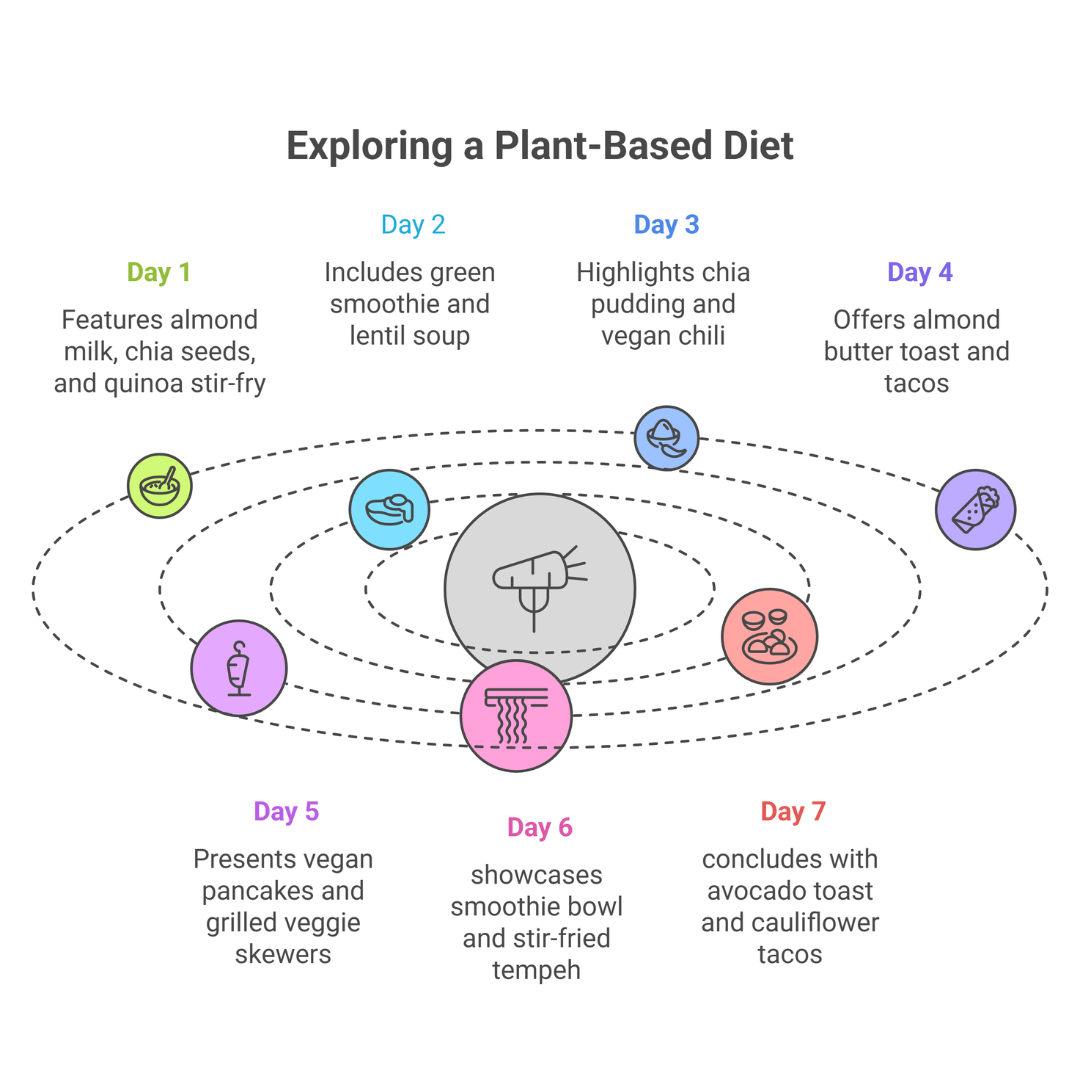
7-Day Plant-Based Meal Plan: Delicious, Nutritious, And Easy-To-Follow
This 7-day plan is designed to introduce you to a world of delicious plant-based flavours while ensuring you stay nourished and satisfied. Enjoy the journey of plant-based eating—one delicious meal at a time!
Day 1
- Breakfast: Almond milk, chia seeds, fruit, and overnight oats.
- Lunch: Chickpea salad wraps with avocado, lettuce, and hummus.
- Dinner: Quinoa stir-fry with tofu and mixed veggies.
- Snack: Apple slices with peanut butter.
Day 2
- Breakfast: Green smoothie with spinach, banana, almond milk, and flaxseeds.
- Lunch: Lentil soup with whole-grain bread.
- Dinner: Spaghetti with marinara sauce and roasted veggies.
- Snack: Carrot sticks with guacamole.
Day 3
- Breakfast: Chia pudding with coconut milk and granola.
- Lunch: Buddha bowl with brown rice, chickpeas, avocado, and greens.
- Dinner: Vegan chilli with black beans, tomatoes, and corn.
- Snack: Mixed nuts and raisins.
Day 4
- Breakfast: Almond butter and banana on wholegrain toast.
- Lunch: Quinoa salad with cucumber, tomatoes, and chickpeas.
- Dinner: Tacos with black beans, sweet potatoes, and salsa.
- Snack: Fruit salad with lime and mint.
Day 5
- Breakfast: Vegan pancakes with maple syrup and berries.
- Lunch: Hummus and veggie wrap with spinach and cucumber.
- Dinner: Grilled veggie and tofu skewers with couscous.
- Snack: Celery sticks with almond butter.
Day 6
- Breakfast: Smoothie bowl with frozen berries, almond milk, and granola.
- Lunch: Buddha bowl with quinoa, kale, avocado, and tempeh.
- Dinner: Stir-fried tempeh with broccoli, carrots, and rice noodles.
- Snack: Roasted chickpeas.
Day 7
- Breakfast: Avocado toast with chia seeds and tomato.
- Lunch: Vegan lentil stew.
- Dinner: Cauliflower tacos with cilantro, lime, and slaw.
- Snack: Apple slices with almond butter.
FAQ
Q1: Is A Plant-Based Diet Expensive?
Focusing on staples like beans, rice, oats, and seasonal vegetables can make it affordable. Cooking at home and purchasing in bulk can also reduce costs.
Q2: How Do I Ensure I’m Getting All My Nutrients?
Diverse meals with whole grains, legumes, vegetables, and nuts provide a broad range of nutrients. Planning meals carefully helps you cover all nutritional bases.
Q3: Can A Plant-Based Diet Improve Skin Health?
Yes! The antioxidants and vitamins in plant-based foods, such as vitamin C from fruits and vegetables, can promote clear, glowing skin and reduce inflammation.
Q4: Will My Energy Levels Improve On A Plant-Based Diet?
Many people report steady energy throughout the day due to a plant-based diet's nutrient-dense, balanced nature, free from blood sugar crashes linked to processed foods.
Q5: How Does A Plant-Based Diet Impact Mental Clarity?
A plant-based diet rich in omega-3s, magnesium, and antioxidants can support brain health, enhance mood, and improve cognitive function.
Q6: Can I Still Enjoy Comfort Foods On A Plant-Based Diet?
Definitely! Plant-based versions of comfort foods like pizza, burgers, and pasta are equally satisfying and flavoured.
Conclusion
In conclusion, a plant-based diet has benefits such as improved health, increased energy, and a positive environmental impact, all of which contribute to a sustainable and vibrant lifestyle.
You may boost your energy levels, encourage sustainable living, and reduce your risk of chronic diseases by eating more plant-based foods. Embracing this lifestyle enhances your well-being and contributes positively to the planet’s future.
I trust you enjoyed this article on the Benefits Of A Plant-Based Diet. Please stay tuned for more plant-based recipes, vegan travel tips, and lifestyle inspiration.
Take care!
— JeannetteZ 🌿
💬 Your Opinion Is Important To Me
Do you have thoughts, ideas, or questions? I’d love to hear from you. Please leave your comments below, or email me directly at Jeannette@LivingTheVeganLifestyle.org.
📚 More Vegan Lifestyle Reads
🌱 My #1 Recommendation for Online Success
Sharing my passion for vegan living — from food to fashion — has been such a rewarding journey.
If you’ve ever dreamed of building your own ethical lifestyle brand or blog, this is the best place to start.
🌟 See How Vegan Bloggers Build Online Income — Try WA Free (No Credit Card Needed)
Disclosure
This post may contain affiliate links. As an Amazon Associate and participant in other affiliate programs, I earn from qualifying purchases at no extra cost to you. Please read my full affiliate disclosure.

